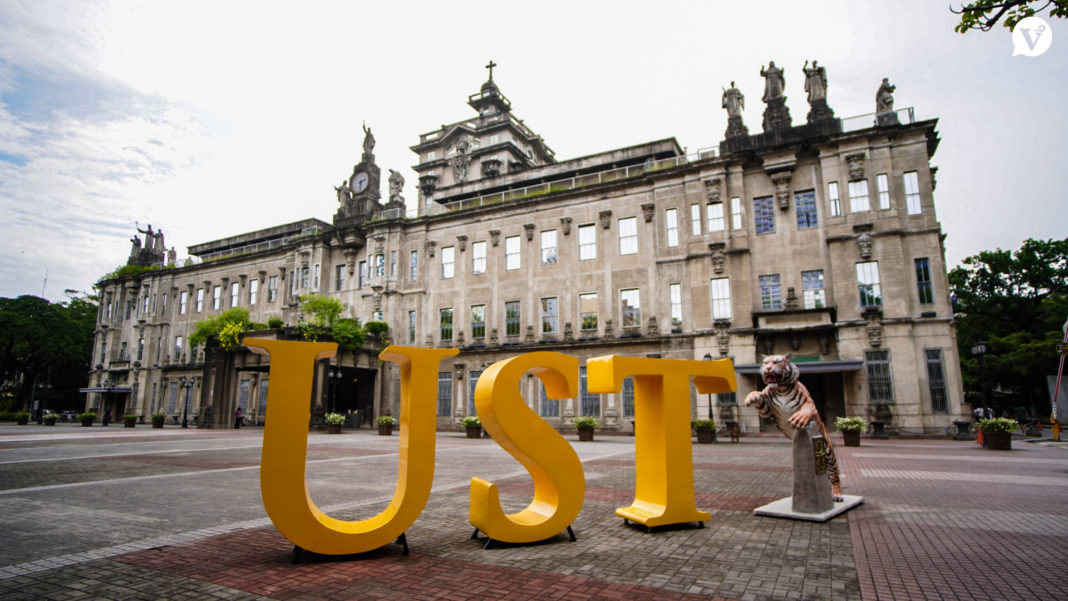UST student leaders expressed dissatisfaction with the rushed consultation conducted by the University administration regarding the proposed 7-percent increase in tuition and other fees for Academic Year 2023 to 2024.
Student leaders also said tuition hikes could not be justified as most classes continued to be conducted online instead of in person.
“We are opposing the proposed tuition fee increase because it is incredibly high and bereft of further transparency and opportunity to be consulted with,” incoming Central Student Council President Ierathel Tabuno told the Varsitarian.
According to Memorandum Order No. 3 issued by the Commission on Higher Education (CHEd) in 2012, higher education institutions (HEIs) are required to provide 15 days’ notice to stakeholders before conducting consultations.
UST gave the official notification on April 17 and discussed the proposed increases with the incoming CSC Executive Board on April 27 via Zoom. The meeting was also attended by officials of the Office of the Vice Rector for Finance and the Office for Student Affairs.
CHEd gave HEIs until April 28 to hold consultations with stakeholders regarding the tuition increase, and until June 1 to submit documents to the government.
The incoming CSC Executive Board said it had “insufficient time” to process the breakdown of the proposal.
“The said increase was finally presented only at the same meeting and [what] immediately followed was an open forum shorter than the indicated time in the program flow,” it said in a statement.
Outgoing CSC President Nathan Agustin told the Varsitarian that the outgoing CSC Executive Board, as well as local student councils, were excluded from the meeting.
Agustin said that during the meeting, which lasted 74 minutes, the incoming CSC leaders were unable to thoroughly examine the proposed increases in fees.
“Mahaba ang oras para sa presentation of justifications pero maiksi lang ang oras para sabihin ang mga objections,” he said.
“[K]ulang sa oras para magsalita. Kulang nga sa oras para mag-isip e kasi ‘yung details on [tuition increase], ni-release on the same consultation meeting itself. So how can a student think about every single detail na prinesent in just a span of a few seconds?”
According to information obtained by the Varsitarian, the 7-percent increase in tuition and other fees will be used to adjust the compensation of University staff and the cost of University operations amid rising prices of goods and services.
It will also cover the implementation of the online payment gateway during enrollment, resumption of sports activities on campus, full utilization of laboratories, and face-to-face training and immersion in the National Service Training Program.
The University proposed a new payment scheme for the next academic year: a 40 percent initial payment and four monthly installments amounting to 60 percent of the total.
In AY 2021-2022, the University adopted a 50-percent downpayment policy.
HEIs must consider different factors before hiking fees, such as inflation, the financial standing of the school and general studentry, and track record, according to the CHEd memorandum.
The Philippines recorded a 7.6-percent inflation rate in March and 8.6 percent in February, according to the Philippine Statistics Authority.
Not done yet
Agustin said appeals against the tuition increase could still be considered before CHEd’s deadline for schools to submit documents on June 1.
“Kailangan pa ‘yan siyempre i-review ng CHEd at siyempre i-review ng ating iba’t ibang stakeholders na gusto pang magpahabol ng concerns,” he said.
Agustin said that if the tuition increase would push through, the University should implement full face-to-face classes in all colleges and faculties and improve the processing of promissory notes and cash requisitions of student councils and organizations.
“Kasi by giving us more flexible means of processing our finances sa mga councils or organization, mas makakagawa kami ng programs at makaka-respond dito,” he said. “In fact, we might be able to get scholarships na galing [sa] mga councils or organizations.”
The Varsitarian has sought the Office of the Vice Rector for Finance for comment but it has yet to respond as of writing.
College of Education Student Council President-elect Cairo Millendez told the Varsitarian “students may see an increase in tuition and other fees as unjustified if they feel that the quality of education has been compromised since most of the classes are not face-to-face.”
Faculty of Arts and Letters Student Council President-elect Timothy John Santiago shared the same sentiment, stating that in-person services were not being fully utilized in the hybrid setup.
The University will stick to hybrid learning for AY 2023 to 2024 to “take advantage of the gains from the enriched virtual mode of instruction.”
“[I]t remains unclear how the University can justify raising tuition and fees when traditional in-person services and facilities are underutilized,” Santiago told the Varsitarian. with reports from Camille M. Marcelo and Eduardo Fajermo Jr.

















